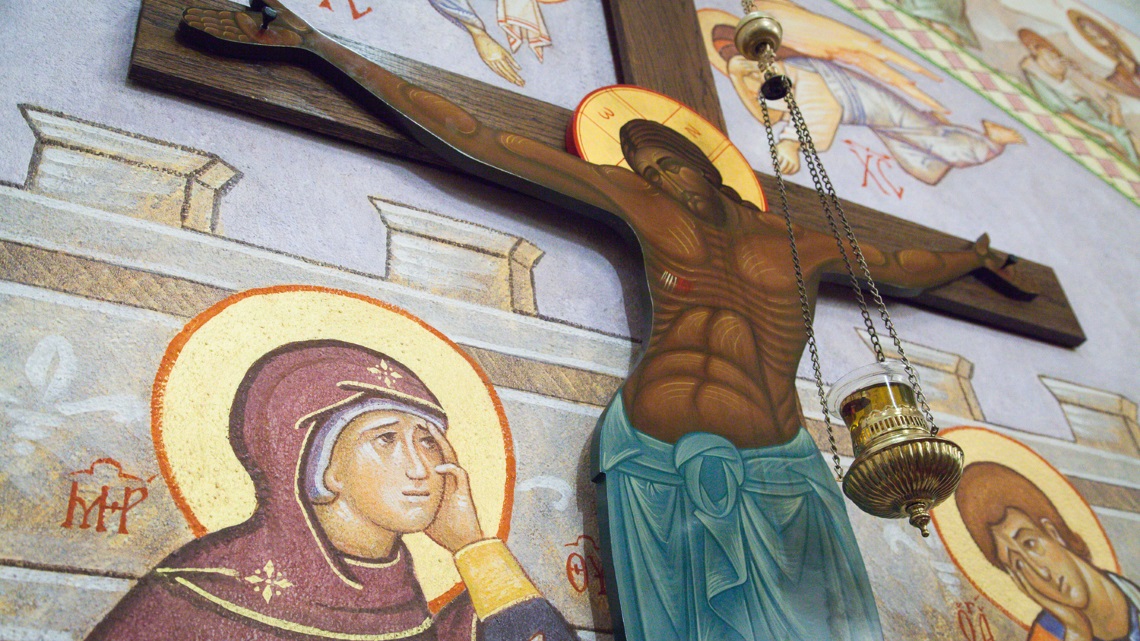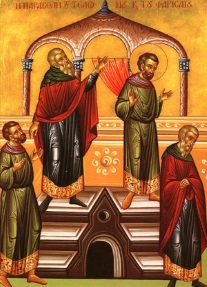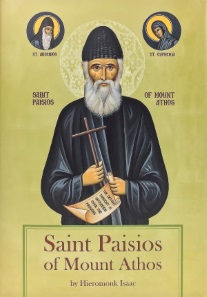
Lent is that time during the Christian Year when we can all, to some humble degree, emulate the life of monastics — attending numerous services during the week along with the usual Saturday Vespers and the Divine Liturgy on Sunday.not to mention keeping the Great Lenten Fast, all of this together with our Orthodox brothers and sisters.
But it is also a time to get into better shape spiritually, setting up an exemplar for ourselves of how we should live every day of the year. This “primer” of Orthodox spiritual practice is adapted from the web page of St Nicholas Antiochian Church in St Petersburg, Florida.

Orthodox Christians are blessed with a rich tradition of worship that has been passed down intact from ancient times, and most of us are aware of the great treasure we possess in our liturgical inheritance. But there is a tradition of spirituality, too, that not only complements the liturgical cycles, but allows each believer to participate in them fully and deeply and carry the depths of Eucharistic experience into everyday life.
Unfortunately, this spiritual tradition has not always been transmitted with as much care. Many Orthodox Christians, especially in the so-called “diaspora,” are not really aware of what spiritual practices traditionally form the core of Orthodox living. This is especially unfortunate, since it is largely through these practices that Orthodoxy exhibits its power to heal the soul and transform it into a likeness of Christ, a process the Church calls theosis.
So perhaps in Lent, which is a time during which we are all called to some degree of spiritual athleticism, according to our individual abilities, it is especially appropriate to reflect on those practices that heal and transform the soul, making Ortho-doxy (the proper [orthos] glorification [doxa] of God) not just something on our lips Sunday mornings, but radiating from our hearts in all times and places.
Just as “benchmarks” can be set up for measuring the performance of automobiles or computers or (better yet) athletes, so too there are spiritual benchmarks as well, passed down from the time of early Christianity, which have proven themselves over all generations since. As we enter Great Lent, let us look to these benchmarks to examine whether our spiritual life is really up to speed, and if not, add them as we are able.
1. The Rule of Prayer
Each Orthodox Christian should own a prayer book. The small, red Antiochian book is serviceable, but a more comprehensive prayer book (such as the Jordanville prayer book) will offer more and richer options. Based on these, each of us should have a set of morning and evening prayers that we faithfully offer up to God. To these, we will of course want to add our own petitions and intercessions, but learning to pray is best done by learning the prayers of the holiest fathers and mothers of the Church, from whom the prayer book has taken its offerings.
These people are friends of God, they know how to speak with Him. And over time, their diction becomes our own. Gradually, wonderfully, we begin to think and speak like them. Start modestly in the beginning, using only as many prayers as you feel confident you can say every morning and evening.
Pray in your icon corner at home. According to the directions of your spiritual father, you may also want to accompany these prayers with prostrations. Many find candles and incense helpful in their daily prayers as well. Before long, leaving the house or retiring to sleep without having first said your prayers will be unthinkable to you.
Note: The entire Jordanville Prayer Book can be downloaded free online.
2. The Jesus Prayer

The Jesus Prayer, as non-Orthodox Christians are now discovering, is one of the most wonderful treasures of Orthodox spirituality. Yet many Orthodox Christians are unfamiliar with it. It is simply the words “Lord Jesus Christ, Son of God, have mercy on me, a sinner.” Or in its shorter version, as it is often recommended on Mt Athos: “Lord Jesus Christ, have mercy on me.”
The Jesus Prayer is essentially the prayer of the publican, about whom we hear every year on the Sunday of the Publican and Pharisee, anticipating Great Lent itself.
The Jesus Prayer can be said aloud, or silently. With the advent of “Blue Tooth” people seem to talk to themselves so it is possible to drive down the street saying the Jesus Prayer out loud without attracting any notice, except of course from God. Or in the supermarket line, the quiet inward recitation of the Jesus Prayer can replace unkind thoughts about the person in front of us fumbling with a bag full of coupons.
As Orthodox monks and saints have found, when the Jesus Prayer is said over and over, it gradually assumes a life of its own, God Himself beginning to speak within our hearts, just as Christ promised of the Comforter. Our very lives can themselves become a prayer, slowly and over time.
3. Spiritual Reading
An essential benchmark for a healthy Orthodox spirituality is spiritual reading, first of all in the Bible, especially the New Testament, and secondarily books relating the life and teaching of the saints and of those holy monks and nuns that are our contemporaries and speak a language that is closer to us.
There are many ways to structure Bible readings, and your pastor will certainly have suggestions. Read the Holy Bible prayerfully and heedfully, listening for God to speak to you through His Word, for it is a living text that can speak powerfully to each believer, not a code or cipher to be figured out or explained or “mastered.”
There are wonderful Orthodox commentaries on the Bible, such as those of Blessed Theophylact on each of the four Gospels, or the recently translated commentary by Archbishop Averky. There are various versions of the “Synaxarion,” collected lives of the saints, many of them (such as the Prologue of Ochrid) easily available on line.
And the lives and sayings of great modern and contemporary saints, elders, and eldresses speak eloquently of the perennial character of Orthodox holiness. Your church bookstore or library will have a selection. Particularly recommended are Sts Seraphim and Nektarios, Silouan, Paisios, and Porphyrios, along with Elder Aimelianos; and Mother Gavrila. Some manner of spiritual reading should form part of the daily life of every Orthodox Christian.
4. Confession.

Too many Orthodox Christians have views of sin that are essentially Western, seeing it in juridical terms of guilt and punishment, of broken rules and the anxious search for pardon. For authentic Orthodox Christianity, sin is rather spiritual illness, alienation from God our Father and Creator who loves us and wants us to return to Him, i.e. its view of sin is not juridical but therapeutic, seeing it as illness from which the Church, as spiritual hospital, has the power to heal us and make us whole.
Genuine Orthodox confession, then, is not like an economic transaction involving costs and payments, but rather like a healing therapy session, a time when together with your confessor you can explore the things that are making you spiritually unhealthy, i.e. that are standing between you and the beauty, holiness, and goodness of God.
Real confession is less like paying a fine than like taking a cool shower after walking down a long, hot, dusty road. The priest will be hearing your confession not as a judge, but as a physician’s assistant, as priestly aide to the Great Physician, our Lord Christ, the great healer, and he is entrusted with the healing power of Christ.
Frequency of confession is a matter to be discussed with your spiritual father, but once a month is a good rule of thumb.
5. Who is the Spiritual Father?
The spiritual father is ordinarily your parish priest, who will normally serve as your confessor. Sometimes, by special arrangement, and with the blessing of your parish priest, a monastic may serve as a spiritual father, or even a priest at another parish with whom you may have established a meaningful spiritual relationship.
But there is a primary sense in which the parish priest holds a fatherly responsibility for the health of the soul of each parishioner; it is a solemn and holy charge, which no good priest takes lightly, and which should be granted deep respect by members of the parish.
6. Almsgiving and Good Works
This may seem like the opposite of spirituality, since it relates to our fellow human beings, the work of Martha rather than Mary. But we need to remember our Lord’s charge that as we have done to the least of our brothers and sisters, so have we done to Him.
Good works and almsgiving (and of course, some serious attempt at tithing to support the parish) are not optional, but obligatory actions for Orthodox Christians. They represent the most concrete ways of manifesting our love for God, by seeing his image in all people everywhere and serving them in ways to which we are called.
Each of us is charged with one or more ministries, and it is spiritually vital that we look away from ourselves toward those others whom God has called us to serve. As God gives Himself to us in the Eucharist, sacrificing Himself for us, so too must we do for our fellow humanity, if we are to properly approach the Eucharistic chalice.
7. Holy Eucharist
Unlike many Protestant groups, who see the Eucharist as memorial celebration, and in contrast to Roman teaching on “transubstantiation,” whereby a metaphysical change takes place in the “substance” of the bread and wine, we believe that the Eucharist is a real meeting with the living, resurrected Christ Himself, who is truly present, in a mysterious way, in the Holy Mysteries.
This is indeed why we call them mysteries, rather than sacraments, since the Orthodox do not try to explain how it is that our Lord is fully and truly present them. But we do not regard this in mechanical or metaphysical terms, rather as a real, authentic, and above all personal meeting, not a magical (but indiscernible) transaction.
Because we believe that within the Eucharist we truly encounter the risen Christ, we prepare for it much more than other religious bodies, fasting before the Liturgy (usually, medical conditions aside, from midnight the night before), and preparing ourselves beforehand with the prayers and canons in the prayer books that are meant to make us ready for a miracle for which we could never be fully ready, a real meeting with Christ Himself, the Incarnate God whom we love and worship.
This is the culmination of the week, and of our spiritual lives, the center from which everything else should radiate, the true place we inhabit during good times and bad, our mystical union with Christ our God and a foretaste of eternity.
It is the life-giving event for which all the other “benchmarks” are a preparation — our joyful emergence, along with the risen Christ, from the empty tomb of all that in our lives which must die and pass away, while we say with our brothers and sisters in the Church, Christos Anesti!—Christ is risen! -— and along with Him, we know that one day we will be resurrected as well.

About the Author

- The author is anonymous.

